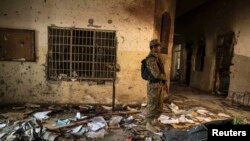Pakistan's Tehreek-i-Taliban (TTP) on Wednesday confirmed the death of Umar Mansoor, one of the group's top leaders and who allegedly was responsible for carrying out several deadly attacks in Pakistan.
Mansoor was reportedly the mastermind behind the 2014 massacre at the Army Public School in Peshawar, which claimed the lives of more than 140 people, a majority of them children.
"We confirm the death of Khalifa Umar Mansoor, and announce that Khalifa Usman Mansoor Hafizullah will succeed him as TTP's ameer (commander) in Darra Adam Khel and Peshawar," said a TTP statement emailed to Pakistani media.
The message didn't reveal any further information on how and under what circumstances the Taliban leader was killed.
Pakistani media however reported that Mansoor had been killed in a U.S. drone strike. There has been two drone strikes against militants in the border region between Afghanistan and Pakistan in recent weeks, which reportedly killed 31 militants, including Mansoor.
The Pentagon has not commented on the development.
Tallal Chaudhry, Pakistan's minister for interior affairs, confirmed Mansoor's death and treated it as a success against the TTP terror group.
"This Taliban commander was involved in many deadly attacks in Pakistan. If we are able to carry on like this, it will definitely help us to win the war against terrorism," Chaudhry told VOA.
"It will also help us to develop the much-needed trust between both Afghanistan and Pakistan," he added.
Attacks on Afghan soil
Pakistani officials allege that Mansoor, also known as Umar Naray and Khalifa Mansoor, was based in Afghanistan and carried out attacks on Pakistan from the Afghan soil.
The 39-year-old Pakistani Taliban commander was a hard-line militant who was staunchly apposed to peace talks between TTP and the government.
Shortly after the 2014 Army Public School attack, he defended the attack and vowed to carry out more.
"If our women and children die as martyrs, your children will not escape. We will fight against you in such a style that you attack us and we will take revenge on innocents," Mansoor said in an online video posted in the aftermath of the attack.
The Army Public School terror attack shook the country and was met with worldwide condemnation.
Mansoor also claimed responsibility for carrying out a fatal attack on the University of Charsadda in the county's Khyber Pakhtunkhwa province in 2016 that left 20 people dead, including 18 students.
The news of Umar Mansoor's death also surfaced in the media last year. It was reported at the time that Mansoor along with another militant leader, Qari Saifullah, were killed in a U.S. drone strike in Afghanistan's eastern Nangarhar province in of July 2016.
Pakistan's Tehreek-i-Taliban didn't issue any statement on the news at the time. The militant group, however, confirmed the death of Mansoor.





